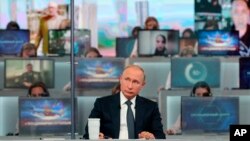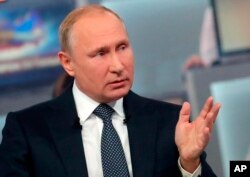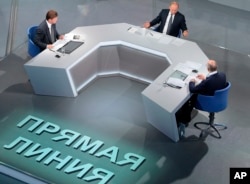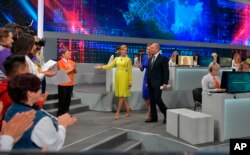Russian President Vladimir Putin held his annual televised call-in show with Russians on Thursday in a semi-choreographed event that highlighted the Russian president’s efforts to raise living standards at home while defending Russian interests abroad.
Amid Putin's 18-year rule, the so-called “Direct Line” has emerged as a key symbol of Russia’s top-down system of government, in which Putin often sits as the sole arbiter of problems befalling citizens of the world’s largest country.
State media claimed that Russians submitted over 2.5 million questions to the Russian leader on topics ranging from health care to gas prices, pension payments, mortgage rates and much, much more.
Despite a grueling live answering session before cameras, the limits of that format were also on display: Putin fielded under a hundred questions in just under 4.5 hours.
Good (economics) vibrations
As anticipated, domestic issues dominated the session.
Indeed, Putiin claimed improving Russians’ lives was his priority after a landslide re-election last March that was marred by accusations of vote tampering but secured Putin’s rule through 2024.
Addressing the economy early on, Putin argued that Russia's finances were “on the right path” and re-emphasized campaign calls that — despite western sanctions — Russia was poised for “breakthroughs” in its development.
“Overall, we are heading in the right direction,” said Putin. “We have started on the trajectory toward robust economic growth in Russia. Yes, this growth is modest, small, but it is also not falling backward.”
The Russian leader again touched on a campaign pledge to halve Russia's poverty rate in his next, and — in theory — final six-year term.
Asked by the event's moderator whether the current government — whose leadership has gone largely unchanged from his previous term — was capable of reaching that goal, Putin assured the “government team was optimal.”
Foreign policy classics
The event also contained Putin’s well-worn barbs against the West — with the United States, in particular, a long favorite target.
Putin said that U.S. allies in Europe — currently engaged in a tariff showdown with the Trump administration — were slowly warming to the message he’d been delivering for years: U.S. foreign and economic policy was aimed at extending American power at the expense of the rest of the world.
“It appears our partners thought that this would never affect them, this counterproductive politics of restrictions and sanctions,” said Putin. “But now we are seeing that this is happening.”
Putin also accused the U.S. of fueling a Cold War-style arms race by abandoning key nuclear arms treaties, while expressing hope that the threat of mutual annihilation would continue to play a deterrent role.
“The understanding that a third world war could be the end of civilization should restrain us,” said the Russian leader.
In a related exchange, Putin assured that a new generation of Russian super weapons — unveiled by Putin in a high-profile speech before Russia's Federal Council last March — were largely now operational and ready to defend Russia, despite doubts from outside experts.
Hot wars
Russia’s very real conflicts also figured prominently.
In Ukraine, where Russia has been engaged in a simmering proxy war since 2014, Putin suggested the government in Kyiv would pay a heavy price if rumors of a planned summer offensive against Russian-backed rebels in the country’s east proved true.
“If this happens, I think it would have very serious consequences for the Ukrainian government in general,” said Putin.
When asked about Russia’s ongoing military campaign in Syria, Putin argued Russia’s military had gained valuable experience from participating in the Syrian conflict but seemed to walk back earlier repeated calls for a large-scale withdrawal of Russian forces.
“Our soldiers are there in order to secure Russia’s interests in this critically important part of the world, which is so near to us. And they will stay there, for as long as it is in Russia’s interest for them to do so.”
Same old same old
Given this was the 16th Direct Line over the course of Putin’s rule, the event had an air of predictability that even the Russian president seemed to acknowledge. On several occasions, Putin noted several topics had been raised in past call-in programs.
When asked whether he had chosen a possible successor, the Russian leader again demurred, noting it was a “traditional question.”
Yet the event was not without at least some surprises. For the first time, a live studio audience was jettisoned in favor of video and phone appeals fielded by young pro-Kremlin “volunteers.”
Key governors and ministers were also a new part of the show, remaining on a direct video feed to address problems in real time — and occasionally faced admonishment from the president — when policies clashed with realities on the ground.
Informed theater
Debate has long simmered over just how choreographed the Direct Line truly is. Obvious propaganda-style cutaways to highlight the government’s achievements mix with genuine complaints to create an atmosphere of what some called “informed theater.”
Adding to that blur were screens in the background that posed apparently unfiltered — and occasionally uncomfortable — questions to the Russian leader.
“Why is there money for tanks, bombs, planes and machine guns, but no money for the people?” went one text message that appeared briefly on screen.
If Putin saw the prompt, it went unacknowledged.
Regardless, the Russian leader looked far more comfortable than he was during a recent interview with Austria's national ORF channel in which Putin repeatedly grew testy over the journalist’s line of inquiry and repeated follow-up questions.
Direct Line offered none of that, and Putin seemed to enjoy the comfortable questions from Russian state media hosts.
“Vladimir Putin, you received a record level of support during the last elections. Do you feel lonely at the top of political Olympus? Lonely without any competitors or competition?”
“No, I’m not lonely,” he replied, adding, “I have my team.”
With that, the Russian leader stared at the screen.







